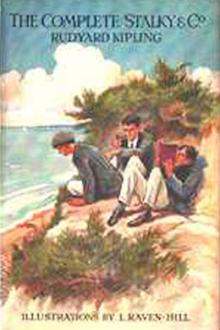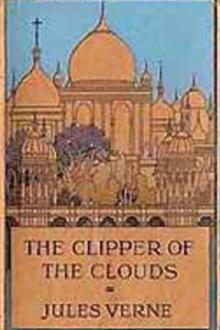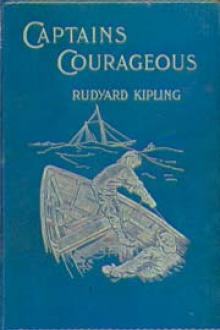Kim, Rudyard Kipling [best romance ebooks TXT] 📗

- Author: Rudyard Kipling
Book online «Kim, Rudyard Kipling [best romance ebooks TXT] 📗». Author Rudyard Kipling
“Umm!”
The frogs were busy in the ditches, and the moon slid to her setting. Some happy servant had gone out to commune with the night and to beat upon a drum. Kim’s next sentence was in the vernacular.
“How didst thou follow us?”
“Oah. Thatt was nothing. I know from our mutual friend you go to Saharunpore. So I come on. Red Lamas are not inconspicuous persons. I buy myself my drug-box, and I am very good doctor really. I go to Akrola of the Ford, and hear all about you, and I talk here and talk there. All the common people know what you do. I knew when the hospitable old lady sent the dooli. They have great recollections of the old lama’s visits here. I know old ladies cannot keep their hands from medicines. So I am a doctor, and—you hear my talk? I think it is verree good. My word, Mister O’Hara, they know about you and the lama for fifty miles—the common people. So I come. Do you mind?”
“Babuji,” said Kim, looking up at the broad, grinning face, “I am a Sahib.”
“My dear Mister O’Hara—”
“And I hope to play the Great Game.”
“You are subordinate to me departmentally at present.”
“Then why talk like an ape in a tree? Men do not come after one from Simla and change their dress, for the sake of a few sweet words. I am not a child. Talk Hindi and let us get to the yolk of the egg. Thou art here—speaking not one word of truth in ten. Why art thou here? Give a straight answer.”
“That is so verree disconcerting of the Europeans, Mister O’Hara. You should know a heap better at your time of life.”
“But I want to know,” said Kim, laughing. “If it is the Game, I may help. How can I do anything if you bukh (babble) all round the shop?”
Hurree Babu reached for the pipe, and sucked it till it gurgled again.
“Now I will speak vernacular. You sit tight, Mister O’Hara ... It concerns the pedigree of a white stallion.”
“Still? That was finished long ago.”
“When everyone is dead the Great Game is finished. Not before. Listen to me till the end. There were Five Kings who prepared a sudden war three years ago, when thou wast given the stallion’s pedigree by Mahbub Ali. Upon them, because of that news, and ere they were ready, fell our Army.”
“Ay—eight thousand men with guns. I remember that night.”
“But the war was not pushed. That is the Government custom. The troops were recalled because the Government believed the Five Kings were cowed; and it is not cheap to feed men among the high Passes. Hilás and Bunár—Rajahs with guns—undertook for a price to guard the Passes against all coming from the North. They protested both fear and friendship.” He broke off with a giggle into English: “Of course, I tell you this unoffeecially to elucidate political situation, Mister O’Hara. Offeecially, I am debarred from criticizing any action of superiors. Now I go on.—This pleased the Government, anxious to avoid expense, and a bond was made for so many rupees a month that Hilás and Bunár should guard the Passes as soon as the State’s troops were withdrawn. At that time—it was after we two met—I, who had been selling tea in Leh, became a clerk of accounts in the Army. When the troops were withdrawn, I was left behind to pay the coolies who made new roads in the Hills. This road-making was part of the bond between Bunár, Hilás, and the Government.”
“So? And then?”
“I tell you, it was jolly-beastly cold up there too, after summer,” said Hurree Babu confidentially. “I was afraid these Bunár men would cut my throat every night for thee pay-chest. My native sepoy-guard, they laughed at me! By Jove! I was such a fearful man. Nevar mind thatt. I go on colloquially ... I send word many times that these two Kings were sold to the North; and Mahbub Ali, who was yet farther North, amply confirmed it. Nothing was done. Only my feet were frozen, and a toe dropped off. I sent word that the roads for which I was paying money to the diggers were being made for the feet of strangers and enemies.”
“For?”
“For the Russians. The thing was an open jest among the coolies. Then I was called down to tell what I knew by speech of tongue. Mahbub came South too. See the end! Over the Passes this year after snow-melting”—he shivered afresh—“come two strangers under cover of shooting wild goats. They bear guns, but they bear also chains and levels and compasses.”
“Oho! The thing gets clearer.”
“They are well received by Hilás and Bunár. They make great promises; they speak as the mouthpiece of a Kaisar with gifts. Up the valleys, down the valleys go they, saying, ‘Here is a place to build a breastwork; here can ye pitch a fort. Here can ye hold the road against an army’—the very roads for which I paid out the rupees monthly. The Government knows, but does nothing. The three other Kings, who were not paid for guarding the Passes, tell them by runner of the bad faith of Bunár and Hilás. When all the evil is done, look you—when these two strangers with the levels and the compasses make the Five Kings to believe that a great army will sweep the Passes tomorrow or the next day—Hill-people are all fools—comes the order to me, Hurree Babu, ‘Go North and see what those strangers do.’ I say to Creighton Sahib, ‘This is not a lawsuit, that we go about to collect evidence.’” Hurree returned to his English with a jerk: “‘By Jove,’ I said, ‘why the dooce do you not issue demi-offeecial orders to some brave man to poison them, for an example? It is, if you permit the observation, most reprehensible laxity on your part.’ And Colonel Creighton, he laughed at me! It is all your beastly English pride. You think no one dare conspire! That is all tommy-rott.”
Kim smoked slowly, revolving the business, so far as he understood it, in his quick mind.
“Then thou goest forth to follow the strangers?”
“No. To meet them. They are coming in to Simla to send down their horns and heads to be dressed at Calcutta. They are exclusively sporting gentlemen, and they are allowed special faceelities by the Government. Of course, we always do that. It is our British pride.”
“Then what is to fear from them?”
“By Jove, they are not black people. I can do all sorts of things with black people, of course. They are Russians, and highly unscrupulous people. I—I do not want to consort with them without a witness.”
“Will they kill thee?”
“Oah, thatt is nothing. I am good enough Herbert Spencerian, I trust, to meet little thing like death, which is all in my fate, you know. But—but they may beat me.”
“Why?”
Hurree Babu snapped his fingers with irritation. “Of course I shall affeeliate myself to their camp in supernumerary capacity as perhaps interpreter, or person mentally impotent and hungree, or some such thing. And then I must pick up what I can, I suppose. That is as easy for me as playing Mister Doctor to the old lady. Onlee—onlee—you see, Mister O’Hara, I am unfortunately Asiatic, which is serious detriment in some respects. And allso I am Bengali—a fearful man.”
“God made the Hare and the Bengali. What shame?” said Kim, quoting the proverb.
“It was process of Evolution, I think, from Primal Necessity, but the fact remains in all the cui bono. I am, oh, awfully fearful!—I remember once they wanted to cut off my head on the road to Lhassa. (No, I have never reached to Lhassa.) I sat down and cried, Mister O’Hara, anticipating Chinese tortures. I do not suppose these two gentlemen will torture me, but I like to provide for possible contingency with European assistance in emergency.” He coughed and spat out the cardamoms. “It is purely unoffeecial indent, to which you can say ‘No, Babu’. If you have no pressing engagement with your old man—perhaps you might divert him; perhaps I can seduce his fancies—I should like you to keep in Departmental touch with me till I find those sporting coves. I have great opeenion of you since I met my friend at Delhi. And also I will embody your name in my offeecial report when matter is finally adjudicated. It will be a great feather in your cap. That is why I come really.”
“Humph! The end of the tale, I think, is true; but what of the fore-part?”
“About the Five Kings? Oah! there is ever so much truth in it. A lots more than you would suppose,” said Hurree earnestly. “You come—eh? I go from here straight into the Doon. It is verree verdant and painted meads. I shall go to Mussoorie to good old Munsoorie Pahar, as the gentlemen and ladies say. Then by Rampur into Chini. That is the only way they can come. I do not like waiting in the cold, but we must wait for them. I want to walk with them to Simla. You see, one Russian is a Frenchman, and I know my French pretty well. I have friends in Chandernagore.”
“He would certainly rejoice to see the Hills again,” said Kim meditatively. “All his speech these ten days past has been of little else. If we go together—”
“Oah! We can be quite strangers on the road, if your lama prefers. I shall just be four or five miles ahead. There is no hurry for Hurree—that is an Europe pun, ha! ha!—and you come after. There is plenty of time; they will plot and survey and map, of course. I shall go tomorrow, and you the next day, if you choose. Eh? You go think on it till morning. By Jove, it is near morning now.” He yawned ponderously, and with never a civil word lumbered off to his sleeping-place. But Kim slept little, and his thoughts ran in Hindustani:
“Well is the Game called great! I was four days a scullion at Quetta, waiting on the wife of the man whose book I stole. And that was part of the Great Game! From the South—God knows how far—came up the Mahratta, playing the Great Game in fear of his life. Now I shall go far and far into the North playing the Great Game. Truly, it runs like a shuttle throughout all Hind. And my share and my joy”—he smiled to the darkness—“I owe to the lama here. Also to Mahbub Ali—also to Creighton Sahib, but chiefly to the Holy One. He is right—a great and a wonderful world—and I am Kim—Kim—Kim—alone—one person—in the middle of it all. But I will see these strangers with their levels and chains...”
“What was the upshot of last night’s babble?” said the lama, after his orisons.
“There came a strolling seller of drugs—a hanger-on of the Sahiba’s. Him I abolished by arguments and prayers, proving that our charms are worthier than his coloured waters.”
“Alas, my charms! Is the virtuous woman still bent upon a new one?”
“Very strictly.”
“Then it must be written, or she will deafen me with her clamour.” He fumbled at his pencase.
“In the Plains,” said Kim, “are always too many people. In the Hills, as I understand, there are fewer.”
“Oh! the Hills, and the snows upon the Hills.” The lami tore off a tiny square of paper fit to go in an amulet. “But what dost thou know of the Hills?”
“They are very close.” Kim thrust open the door and looked at the long, peaceful line of the Himalayas flushed in morning-gold. “Except in the dress of a Sahib, I have never set foot among them.”
The lama snuffed the wind wistfully.
“If we go North,”—Kim put the question to the waking sunrise—“would not much mid-day heat be avoided by walking among the lower hills at least? ... Is the charm made, Holy One?”
“I have written the names of seven silly devils—not one of whom is worth a grain of dust in the eye. Thus do foolish women drag us from the Way!”
Hurree Babu came out from behind the dovecote washing his teeth with ostentatious ritual. Full-fleshed, heavy-haunched, bull-necked, and deep-voiced, he did not look like “a fearful man”. Kim signed almost imperceptibly that matters were in good train, and when the morning toilet was over, Hurree Babu, in flowery speech, came to do honour to the lama. They ate, of course, apart, and afterwards the old lady, more or less veiled behind a window, returned to the vital business of green-mango colics in the young. The lama’s knowledge of medicine was, of course, sympathetic only. He believed that the dung of a black horse, mixed with sulphur, and carried in a snake-skin, was a sound remedy for cholera; but the symbolism interested him far more than the





Comments (0)